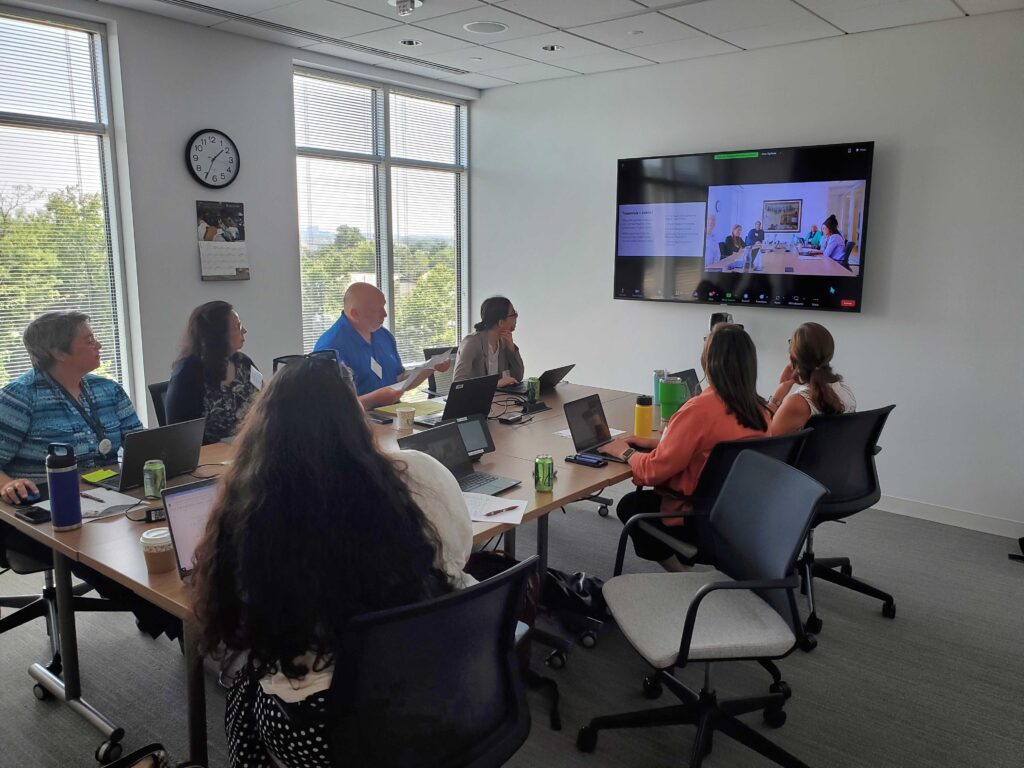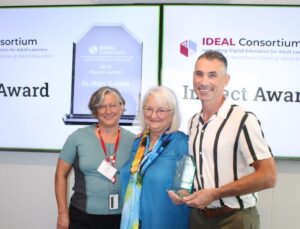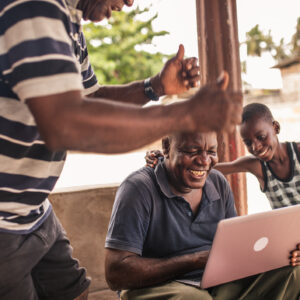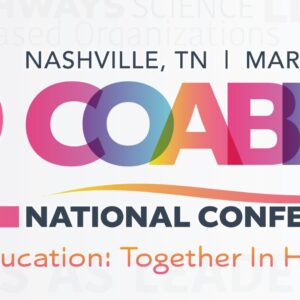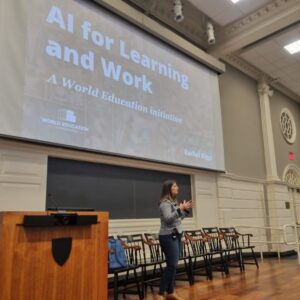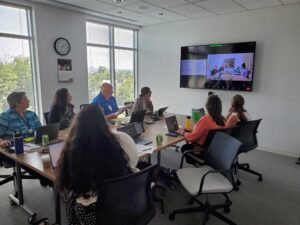
World Education hosted its 8th annual Innovating Digital Education for Adult Learners (IDEAL) Consortium Summer Institute in Washington, D.C. and online. This multi-day professional learning event convened 100 national adult education and digital learning leaders to share, learn, and strategize as they look to design and implement digital education programs across the nation.
As is the case each year, attendees shared challenges, solutions, and resources through facilitated hybrid discussion and short presentations. We recognized innovative programming and leadership through our IDEAL Institute awards and featured learning blocks. Highlights include:
State Discussions: Collaborate to Innovate
Adult education professional development (PD) leaders from eighteen states shared highlights of their work in the past year, discussed challenges they are facing, and processed ideas to address these challenges or amplify promising strategies and resources. Of note, the state reports mentioned the following:
- Arizona presented on the professional development they are providing to teachers on generative artificial intelligence. In addition, they have made further progress with their teacher verification model for reporting proxy content hours by providing a searchable lesson repository for AZ teachers.
- California shared many exciting updates, including upcoming AI integration in Adult Ed lunch breaks for teachers, expansion of their Digital Leadership Academy and updates to transform their Digital Learning Guidance from a standalone document to a comprehensive resource package with accompanying materials to support implementation of the guide.
- Colorado’s The Learning Source has become our newest member organization. The @Learning Source team shared updates on a new digital navigators program that will be implemented at 22 sites in the state.
- Maine has awarded $4 million in grants to 14 different projects in all 16 counties to support increased access for learners, digital skills development and state-wide collaboration under the Strengthening Maine Workforce initiative.
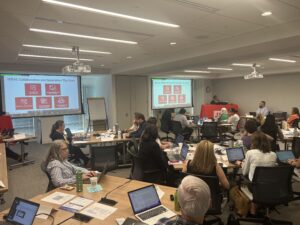
- Maryland is continuing to implement its Digital Literacy Framework and recently published Maryland Digital Literacy Framework Learning Modules in January 2023, which it is further refining through a Study Circles Pilot.
- Michigan received additional funding to expand its digital literacy efforts in adult education programs, including a $15 million grant to identify promising practices, approaches, and tools for digital skills development and digital inclusion efforts across the state aimed towards scaling and strengthening inclusive digital learning opportunities and programming.
- Minnesota has expanded HyFlex programming and support for teachers in their technology integration, such as enhancing their distance learning webpage, so practitioners can easily search and filter through the 55+ approved EdTech platforms to select those most relevant to their students’ needs.
- New Mexico has seen a lot of growth in the last year and presented its plans to expand its HyFlex programming.
- Pennsylvania has worked to build out their digital literacy strategy including developing a common framework for Digital Literacy Skills Development across their adult education continuum as well as resources for Digital Literacy Specialists.
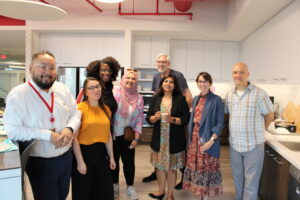
- Rhode Island shared funding updates for their ABE and digital inclusion programming throughout the state as well as enhancements to their Guidelines for Distance and Blended Programming.
- Tennessee has rolled out a pilot to support English for Speakers of Other Languages (ESOL) programs in implementing distance education and is using EnGen on tablets to provide contextualized digital literacy instruction in correctional facilities.
- Texas has continued to scale use of Northstar and Essential Education for digital literacy assessments as it works towards developing its own Digital Literacy Standards for the state. Texas also developed a free digital literacy curriculum (Digital Access and Resiliency for Texas) for ESOL learners.
- South Carolina recently shifted to a new Learning Management System (LMS) and is rolling out TA support to its teachers; additionally, they have provided training on their state’s Assessment Policy and developed several resources for teachers including TABE and GED math lessons on Wakelet.
- Virginia will be using EdTech Routines to support digital skills development under an upcoming pilot in collaboration with the Digital Resilience in the American Workforce (DRAW) project. Other updates include developing guidance for programs developing online courses as well as providing training to educators on trauma-informed instruction.
- Washington, D.C. is scaling its work integrating Participatory Action Research on HyFlex instruction into Integrated Education and Training (IET) programming. Providers will implement the HyFlex model in one IET class while also working to further contextualize all of their IE&T lessons using the O*NET standards.
Breakout Sessions
Online and in person attendees gathered in twenty-six hybrid breakout sessions over the two and a half days of learning. The topics fit within these five learning blocks, which included short presentations and facilitated discussion:
Digital Equity and Inclusion. This learning block allowed participants to explore and discuss ecosystems, the digital equity act, digital navigation, accessibility, and technology in corrections.
State and Program Administration. Change management, digital learning guidance and policies, data management, call center development, and marketing were all covered during this learning block.
Digital Literacy, Skills, and Resilience. Participants addressed integration of digital literacy skills, open educational resources, digital literacy in corrections, digital literacy assessment, and learning plans.
Professional Development. In this learning block attendees focused on state PD websites, technology support and integration, badging, new staff onboarding, and supporting practitioners.
Innovative Technologies and Supporting Quality Instruction. This final learning block explored generative AI, universal design for learning, engagement in online learning, Program Evaluation And Reporting System (PEARS) and policy, HyFlex technology and planning, and distance learning in corrections.
Awards
We were honored to present two awards this year: a Lifetime Achievement Award to Tom Cytron-Hysom and an Impact Award to Dr. Mary Gaston.
Lifetime Achievement Award
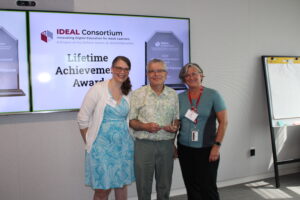
Tom Cytron-Hysom has provided the visionary leadership that took Northstar Digital Literacy from a grassroots community-based project in St. Paul, MN to the most widely-used digital literacy assessment and learning platform in adult education. In 2011, he was instrumental in securing the initial funding to create the first Northstar assessments, and has quietly shepherded the project through 12 years of rapid growth and evolution. Today, Northstar is used in all 50 US states and in multiple countries – an accomplishment that can be directly attributed to Tom’s steady and values-driven leadership.
Tom’s leadership is also evident in Minnesota’s statewide Distance Learning Support Team. Since 2010, Tom has contributed adult education policy expertise that has shaped Minnesota’s distance learning policy and significantly scaled distance learning throughout the state. His extensive knowledge of distance learning and digital literacy work has informed the development of reporting tools in the Minnesota Student Information Database (SID), the creation of a Minnesota ABE Distance Learning website, and the approval of over 50 distance learning platforms for statewide use. Tom was also a founding member of the COABE Technology Integration and Digital Literacy Conference Strand.
Impact Award
Dr. Mary Gaston, Ed.D., has been an educator for over twenty years, serving as director of a local South Carolina Adult Education program, director of a Regional Adult Education Technical Assistance Center, and coordinator of Family Literacy. Mary played an integral role in the development of the Digital Skills Library and Glossary, a collection of free and open resources that have been widely disseminated and relied upon to increase digital resilience in adult education. Her leadership of the OCTAE-funded EdTech Maker Space through which it was greatly expanded has made a tremendous impact.
Additionally, Mary acts as a COABE Regional Representative, offering coordination and support to programs in the Southeast, connecting them to resources and opportunities, and voting on the COABE board. Mary also continues to conduct training both as a LINCS trainer on the national level and as a Training Specialist in SC, offering her expertise and a helping hand at all levels.
Next Steps
Consortium members enjoyed the opportunity to network and collaborate with their peers in person and online. In fact, they requested additional opportunities throughout the year for additional collaboration, in addition to the existing interactive community of practice that all consortium members have access to. Therefore, the IDEAL team hopes to provide learning circles focus on:
- Learning Management System Optimization
- Strategies for measuring and ongoing monitoring of learner digital literacy plans and progress
The IDEAL Team will also explore the idea of a winter check-in in addition to the annual existing mid-year calls as well as networking through social media networks.
We would like to thank our sponsors for the IDEAL Summer Institute: EnGen, Essential Education, ALL IN, New Reader’s Press, and Northstar. We are grateful for your support.
To learn more about the IDEAL Consortium, visit the website. If you have specific questions about the Consortium, reach out to Jen_Vanek@WorldEd.org or Jamie_Harris@WorldEd.org.

